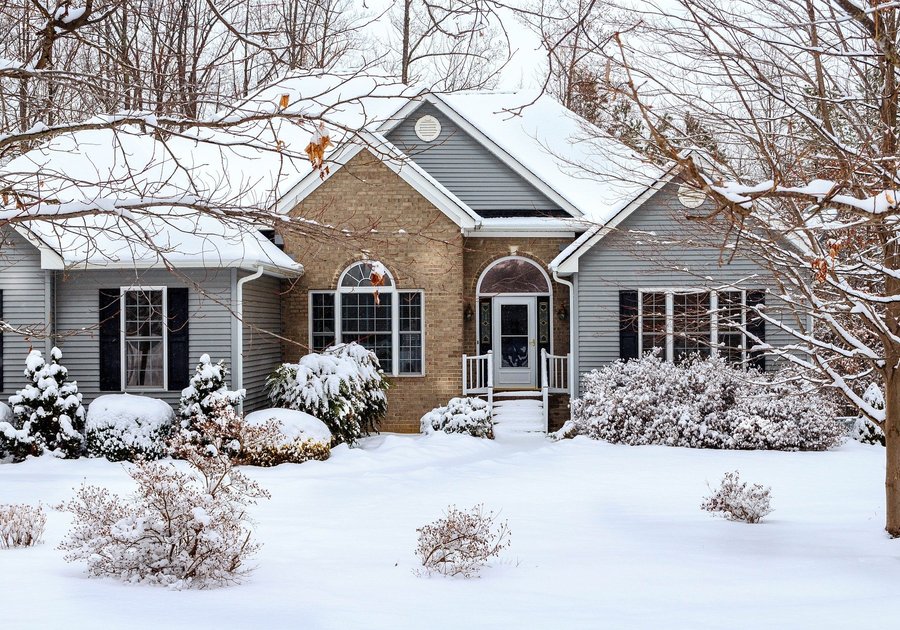After this last snow storm surprised us, lots of us realized that we weren't prepared for winter weather. Here are some tips to make sure you're prepared for winter:
1. Check your gutters. You want to make sure that your gutters are clear of debris to prevent them from overflowing during heavy rain and/or allowing water to stay trapped and freeze.
2. Clear the yard. Look around your yard for tree branches that are hanging over the house, trees that are dead or have dead branches, and any other hazards. Winds and heavy snow can cause these trees and branches to become weak and break. Removing them in advance saves you from possible damages or injuries later.
3. Cover your air conditioner condenser box. This prevents ice and snow from getting inside and prolongs the life of the unit.
4. Plumbing: Be sure to remove the hose, drain it and store it for the winter. Cover your faucet with a cover to keep it from freezing. You can get these from your local hardware store. They typically come as a fabric “sock” that slides over and the string pulls shut, or a plastic or Styrofoam cover that just slides on. The sock is a little more expensive but is less likely to fall or blow off of the faucet.
Learn how to shut off water valves in case a pipe bursts.
5. Have your chimney checked. If you plan to use your fireplace this winter, you want to be sure to have your chimney checked by a professional before you need to use it. A professional will check for build up and cracks, check the chimney cap and damper and make sure that everything is working properly. Also, if you have a wood burning fireplace, now is a good time to stock up the firework pile.
6. Check your Smoke detectors, Carbon Monoxide detectors, and Fire extinguisher. . Be sure to both change the batteries and test the detectors. Most detectors have an expiration date on them. According to the U.S. Fire Administration, smoke detectors are usually good for about 8-10 years. However, combination smoke detector/carbon monoxide detectors are only good for about 5-6 years. This is also a good time to review your fire evacuation plan with your family. You should also have a fire extinguisher handy. They do expire so be sure to check that too.
7. Check your thermostat. If you don’t already have a programmable or smart thermostat, you should look into them. They can save you money by automatically adjusting the temperature in your house and using less gas or electricity. If you plan to be gone from your home for an extended period of time, be sure the thermostat is set to at least 65 degrees to prevent freezing pipes.
8. Check your sump pump if you have one. Heavy storms and melting snow can cause your sump pump to work extra hard. Be sure that it’s in good working order and have a backup on hand in case it stops working. It’s also a good idea to have a battery back-up hooked to your sump pump in the event that the power goes out. You can purchase a battery backup from your local hardware store and install it yourself. If you don't want to install a battery, you can also purchase a hand pump and bucket to have on hand.
9. Insulation: Make sure your home is properly insulated and check the weather stripping around your doors and windows.
10. Create or update your emergency kit. While we all hope that we’re not going to need it, it’s never a bad idea to have an emergency kit prepared. A very basic Emergency kit should include bottled water, blankets, flashlights with extra batteries, battery-powered radio and snacks.
A more thorough kit may include additional items like medication, shelf-stable foods (energy bars, crackers, canned food, dry rice or beans), extra change of clothing and/or coats, battery or hand-crank charging source for your phone, a heat source (portable heater and/or wood for your fireplace) and a generator. If you tend to get a lot of snow, you may also want to have a shovel handy.
If you have medical devices that require electricity or refrigerated medication, be sure to talk with your medical provider about a power outage plan.
You can also print a copy of our Family Safety Binder here.
Tips to help stay warm if your power goes out:
- Close blinds or curtains to keep in some heat.
- Close off rooms to avoid wasting heat.
- Stuff towels or rags in cracks under doors.
- If you have a tent, place it in the warmest room in your home. The smaller area will stay warmer than large rooms.
- If you're using a generator, only use it outside and at least 20 feet away from windows.
- All heaters need space - keep anything flammable at least 3 feet from heaters.



